Unit 2 At the airport 第2课时 课文讲解及句型拓展(共40张PPT)-2022-2023学年六年级英语下册同步精品课堂(牛津上海版)
文档属性
| 名称 | Unit 2 At the airport 第2课时 课文讲解及句型拓展(共40张PPT)-2022-2023学年六年级英语下册同步精品课堂(牛津上海版) |

|
|
| 格式 | pptx | ||
| 文件大小 | 11.6MB | ||
| 资源类型 | 教案 | ||
| 版本资源 | 牛津上海版(试用本) | ||
| 科目 | 英语 | ||
| 更新时间 | 2023-02-15 20:39:16 | ||
图片预览

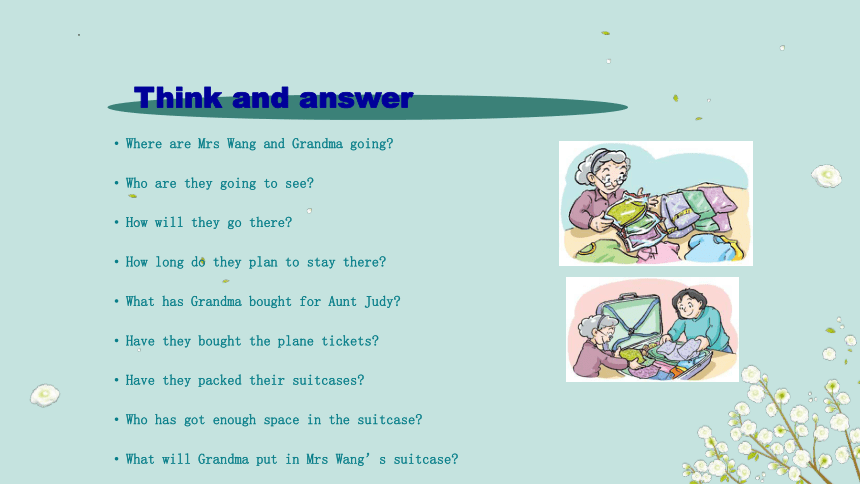
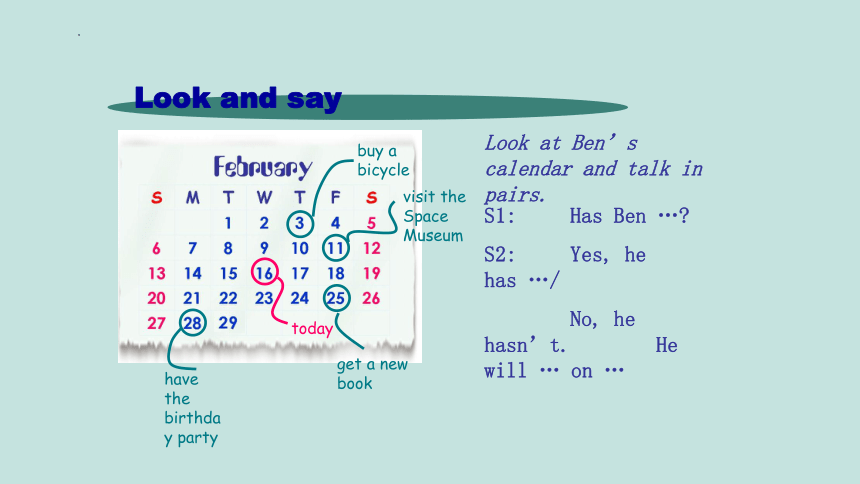
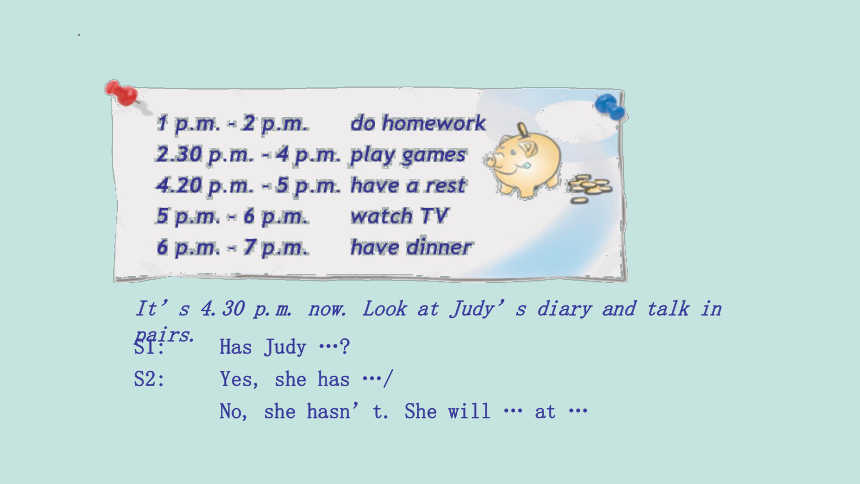
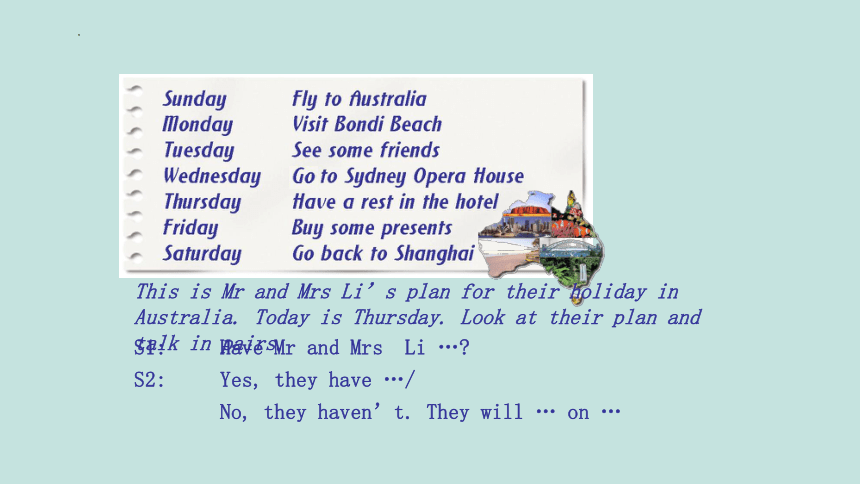
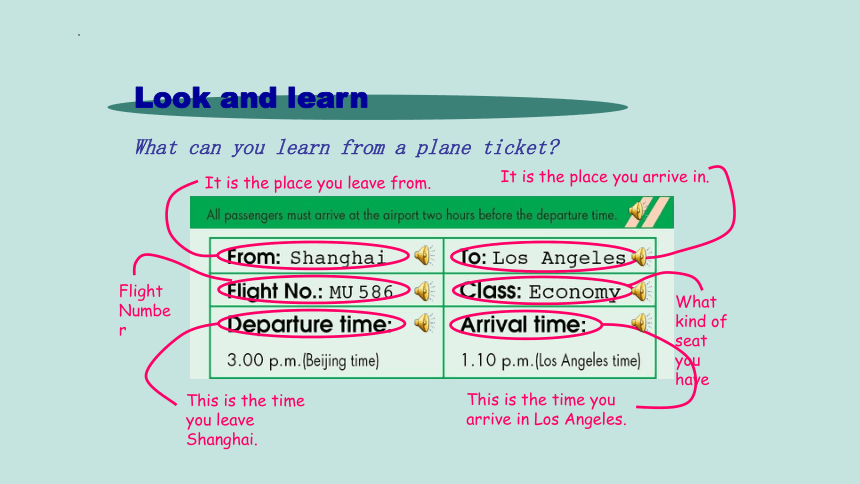
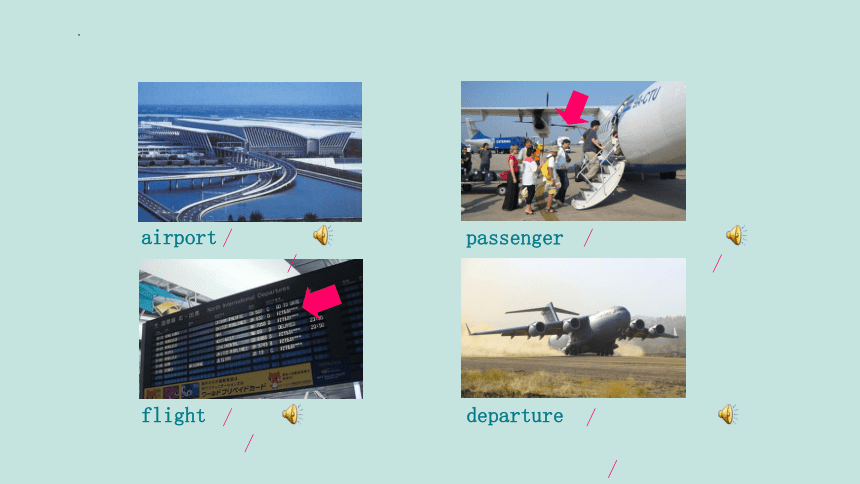
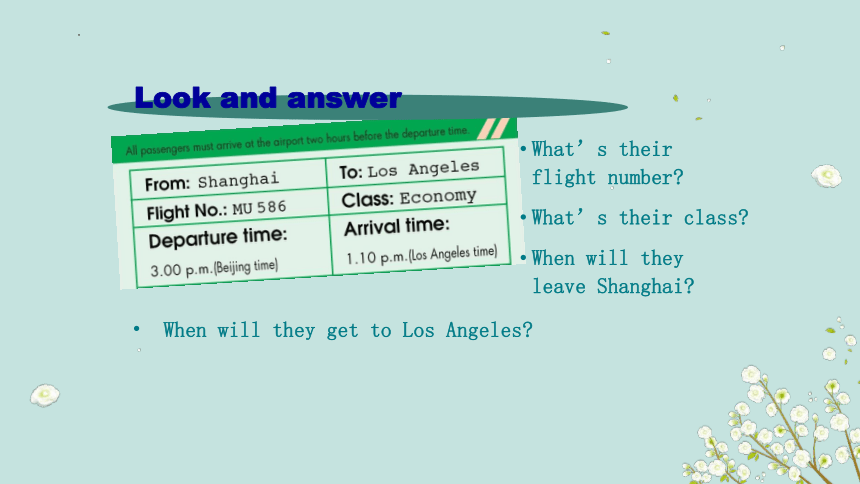


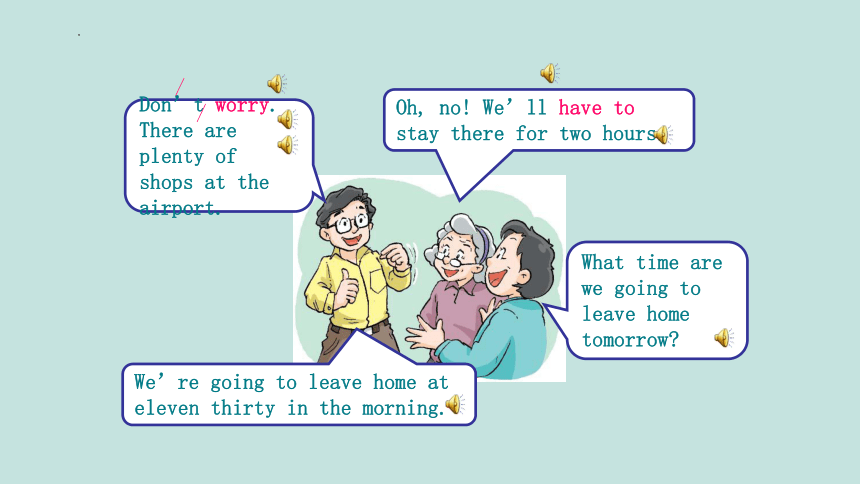
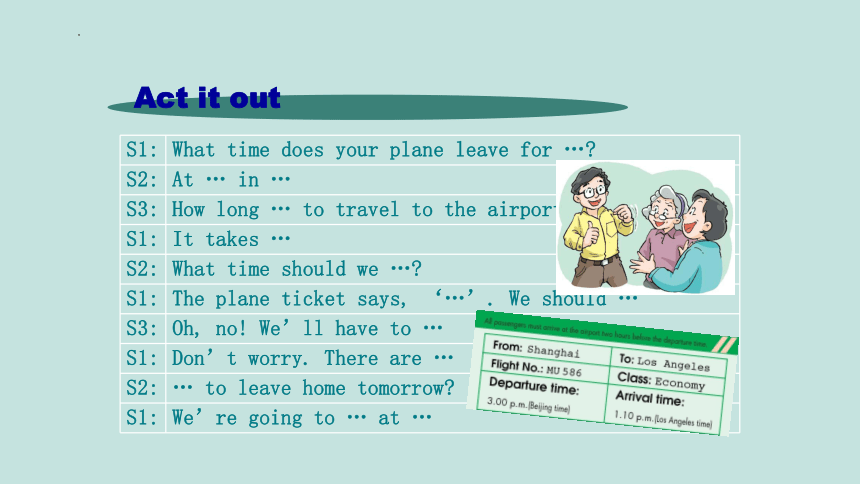
文档简介
(共40张PPT)
At the airport
Episode 2
牛津上海版 英语 六年级 第二学期
Unit 2
Think and answer
Where are Mrs Wang and Grandma going
Who are they going to see
How will they go there
How long do they plan to stay there
What has Grandma bought for Aunt Judy
Have they bought the plane tickets
Have they packed their suitcases
Who has got enough space in the suitcase
What will Grandma put in Mrs Wang’s suitcase
Look and say
Look at Ben’s calendar and talk in pairs.
S1: Has Ben …
S2: Yes, he has …/
No, he hasn’t. He will … on …
today
buy a bicycle
visit the Space Museum
have the birthday party
get a new book
It’s 4.30 p.m. now. Look at Judy’s diary and talk in pairs.
S1: Has Judy …
S2: Yes, she has …/
No, she hasn’t. She will … at …
S1: Have Mr and Mrs Li …
S2: Yes, they have …/
No, they haven’t. They will … on …
This is Mr and Mrs Li’s plan for their holiday in Australia. Today is Thursday. Look at their plan and talk in pairs.
Look and learn
What can you learn from a plane ticket
It is the place you leave from.
It is the place you arrive in.
Flight Number
What kind of seat you have
This is the time you leave Shanghai.
This is the time you arrive in Los Angeles.
airport
flight
passenger
departure
/ /
/ /
/ /
/ /
Look and answer
What’s their flight number
What’s their class
When will they leave Shanghai
When will they get to Los Angeles
Listen and say
Let me drive you to the airport tomorrow.
Thank you.
What time does your plane leave for Los Angeles tomorrow
At three o’clock in the afternoon.
How long does it take to travel to the airport
It takes about one and a half hours.
What time should we arrive at the airport
The plane ticket says, ‘All passengers must arrive at the airport two hours before the departure time.’ We should arrive at the airport before one o’clock in the afternoon.
Oh, no! We’ll have to stay there for two hours.
Don’t worry. There are plenty of shops at the airport.
What time are we going to leave home tomorrow
We’re going to leave home at eleven thirty in the morning.
/ /
Act it out
S1: What time does your plane leave for …
S2: At … in …
S3: How long … to travel to the airport
S1: It takes …
S2: What time should we …
S1: The plane ticket says, ‘…’. We should …
S3: Oh, no! We’ll have to …
S1: Don’t worry. There are …
S2: … to leave home tomorrow
S1: We’re going to … at …
Ask and answer
You are going to another country for a holiday. In pairs, look at the plane ticket and talk about it.
Note: All passengers must arrive at the airport two hours before the departure time. From: Shanghai To: Los Angeles
Flight No.: MU586 Class: Economy
Departure time: Arrival time:
3.00 p.m.
S1: What time does your plane leave for _____ tomorrow
S2: At _____ in the morning/afternoon/evening. What time should I arrive at the airport
S1: You should arrive at the airport before _____ in the morning/afternoon/evening.
Note: All passengers must arrive at the airport two hours before the departure time. From: Shanghai To: Tokyo
Flight No.: JP318 Class: Economy
Departure time: Arrival time:
1.10 a.m.
S1: What time does your plane leave for _____ tomorrow
S2: At _____ in the morning/afternoon/evening. What time should I arrive at the airport
S1: You should arrive at the airport before _____ in the morning/afternoon/evening.
Note: All passengers must arrive at the airport two hours before the departure time. From: Shanghai To: Bangkok
Flight No.: MU256 Class: Economy
Departure time: Arrival time:
8.40 p.m.
S1: What time …
S2: At … in …. What time should …
S1: You … before … in ….
Note: All passengers must arrive at the airport two hours before the departure time. From: Shanghai To: London
Flight No.: VG010 Class: Economy
Departure time: Arrival time:
9.35 a.m.
S1: What time …
S2: At … in …. What time should …
S1: You … before … in ….
/ /
Read and say
Tom can’t find his pen. He can’t write now.
He has to buy a new pen.
He has to borrow a pen from his friend.
He has to look for it everywhere.
I can’t find my key now. I can’t get into my flat.
You have to look for your key.
You have to wait for your parents to come home.
Mary is ill now.
She has to stay in bed.
She has to go to hospital.
Advice corner
You must attend a meeting at 2.00 in Pudong. It’s 1.45 now.
Mary and Peter can’t work out the answers to the Maths problems.
I’m still busy doing my homework but I have a very good concert to go to.
You and your friend have waited for a bus for 20 minutes. No buses are coming.
Important Sentences structures
1. Mrs Wang and Grandma have not been to the USA before.【指点迷津】have/has been to, have/has gone to, have/has been in/at的区别(1)“have/has gone to+地点”表示某人去了某地,现在没有回来,可能在去的途中,或已经到了目的地。e. g. He has gone to Shanghai.他去了上海。He has gone to Dalian. 他去了大连。(2)“have/has been to+地点”表示某人去过某地,此时人已回到说话处,常与twice(两次),several times(几次),ever(曾经)或never(从未)等词组或副词搭配。e. g. The old American man has been to China three times.这位美国老人到过中国三次。Where have you been 你去过哪儿?(3)“have/has been at/in+地点”表示在某地待了多久,后面须用表示一段时间的状语。e. g. He has been at the village for ten years.他在村子里住了10年了。How long have you been in Paris 你在巴黎住了多久?如果have/has been后接的是地点副词here、there时,不用介词at或in。e. g. We have been here for about two hours.我们在这里约两个小时了。
2. They have already done a lot of things.However, they have not packed their suitcases yet.(1) already通常用于肯定句中,表示“已经”。e. g. I have already seen the film. 我已经看过这部电影了。 【友情提示】already一般不用于否定句中,但可用于疑问句中,表示期望得到对方明确的答复或表示一种惊讶,不过此时already常置于句末。e. g. Have you read the book already 你已经看过这本书了吗?(2) yet是副词,意为“已经”,用于否定句和疑问句中,在句中通常是位于句末。e. g. I haven't finished my homework yet.我还没有完成我的家庭作业。【友情提示】yet与not连用,(not yet)可用于作简略回答,意为,“还没有”。e. g. -Have you ever read the book Red Star Over China 你曾读过《西行漫记》这本书吗?-No, not yet.不,还没有。【知识拓展】ever用于现在完成时,表示到现在为止的任何时候,意为“曾经”,多用于疑问句或表示最高级的从句中。e. g. He is the best teacher that I have ever seen. 他是我迄今为止见过的最好的老师。在否定句中,常用never(意为“从来不……;从来没有……”)代替not ever。e. g. I have never visited Hangzhou. 我从未游览过杭州。
3. We should arrive at the airport before one o'clock.【指点迷津】arrive,get,reach的区别三者都可作“到达”解。(1) arrive是不及物动词,后接名词或代词时要加介词in或at,arrive in指的是大地点;arrive at指的是小地点。e. g. When will Jim arrive in Shanghai 吉姆将在什么时候到达上海?We arrived at the station in hot haste.我们急急忙忙赶到车站。(2) get为不及物动词,后接名词或代词时要加介词to。e. g. When do you usually get to school 你通常什么时候到校?We got to London at 7 o’clock.我们7点到达伦敦。(3) reach是及物动词,后面可直接跟表示地点的名词或代词。e. g. We are going to reach Beijing tomorrow morning.我们将在明天早晨到达北京。Please phone me when you reach school.到校后给我打电话。
4. Aunt Judy and Uncle Mike have lived in Los Angeles for six years.for后面常接一个指时间长度的词或词组表示一段时间。【知识拓展】since后面也可以接表示过去时间的词或词组,也可以引导一个过去时间的从句,表达的是自从过去某一时间直到现在的一段时间。这时since表示时间段与for后面接一段时间所起的作用是一样的,二者经过变化以后,常可以互换使用。e. g. The Greens have lived in China for two years.=The Greens have lived in China since two years ago.格林一家在中国住了两年了。We've known each other since ten years ago. =We've known each other for ten years.自从十年前,我们就认识了。
5. We'll have to stay there for two hours. have to意为“不得不”,用于表示一种必要,后接动词原形。 【指点迷津】must,have to的区别 must与have to都可意为“必须;应该;不得不”,其区别为: (1) must表示说话人的主观看法,即主观上的必要性,没有时态、人称变化。 e. g. You must work hard at your lessons.你们应该努力学习功课。 I must go home.我必须回家。 (2) have to一般表示客观方面的需要,有时态和人称的变化。 e. g. I have to go there.我得去那儿。 We had to stay at home yesterday.昨天我们不得不待在家里。 (3) must的否定式为mustn't,表示“不应该;禁止;不允许”。 e. g. You mustn't play football on the street.不要在马路上踢足球。 (4)have to的否定式为do not have to,英国英语中常用need not来代替don't have to,表示“不必要”, e. g. You do not have to come every day.=You needn't come every day. 你不必天天来。
Rewrite the following sentences as required(根据所给要求,改写下列句子。每空格限填一词。)
1.Susan has her piano lesson on Saturday afternoon. (改成一般疑问句)
__________ Susan __________ her piano lesson on Saturday afternoon
2.Mary found her magazine in the library yesterday.(改成否定句)
Mary _________ _________ her magazine in the library yesterday.
3.The story “Mr. Wind and Mr. Sun” sounds very interesting. (对划线部分提问)
_________ _________ the story “Mr. Wind and Mr. Sun” sound
4.Everyone needs to study hard for a better future. (保持原句意思)
________ is ________ for everyone to study hard for a better future.
随堂练习一
1. Does have 2. didn’t, find 3. How does 4. It necessary
【解析】1.原句has是实意动词have(上课)的三单形式,需借助助动词does变为一般疑问句,has恢复原形。句首单词的首字母需大写,根据句意结构,可知填(1). Does (2). have。
2.原句found是实意动词find(发现)的过去式,需借助助动词did加not变为否定句,动词found恢复原形。根据句意结构,可知填(1). didn’t, (2). find。
3.原句对very interesting划线,是问听起来怎么样,需用how提问。根据句意结构,可知填(1). How (2). does。
4.本句适用“It’s +形容词+ for sb. +不定式”结构,表示“某人做某事是……”,it是形式主语,后面的不定式是真正主语。根据句意结构,可知填(1). It (2). necessary。
【点睛】句型转换,综合考查句式结构,动词形式、时态和语态,需要考生结合句子的主语确定动词形式,根据时间状语的提示确定时态,根据主语和动词之间的关系确定语态。同时注意各种从句和固定句式的运用。例如小题2,原句found是实意动词find(发现)的过去式,需借助助动词did加not变为否定句,动词found恢复原形。根据句意结构,可知填(1). didn’t, (2). find。
Rewrite the following sentences as required(根据所给要求, 改写下列句子)
5.David ate four hamburgers for dinner yesterday.(改为一般疑问句)
__________ David ___________ four hamburgers for dinner yesterday
6.They did some sports last week.(改为否定句)
They ____________ ____________ any sports last week.
7.My brother often got up late, but now he gets up early.(保持句意基本不变)
My brother __________ __________ get up late, but now he gets up early.
8.We should drink eight glasses of water every day.(对划线部分提问)
How _________ water ___________ we drink every day
9.They played football there yesterday.(对划线部分提问)
___________ __________ they do there yesterday
随堂练习二
5. Did; eat 6. didn't do 7. used to 8. much; should 9. What did
【解析】5.句意:大卫昨天晚餐吃了四个汉堡。
考查一般疑问句。题目中时态为一般过去时,谓语部分是实义动词eat的过去式ate,所以一般疑问句用助动词did提问,ate变回原形eat。故填Did,eat。
6.句意:上周他们做了一些运动。
考查否定句。句子时态为一般过去时,谓语是实义动词do的过去式did,此处肯定句变否定句时,需要借用助动词did构成didn’t,did变回原形do。故填didn’t,do。
7.句意:我兄弟过去起床晚,现在起床早了。
根据题目中got up late可知,前一个分句描述的是过去的情形,改为同义句时用used to do sth. 过去常常做某事。故填used,to。
8.句意:我们每天应该喝八杯水。
题目中的划线部分eight glasses of是水的数量,water是不可数名词,所以提问用how much;should是情态动词,变成疑问句时直接放在主语we的前面即可。故填much,should。
9.句意:他们昨天在那里踢足球。
划线部分played football表示具体做的事情,所以提问时用what;play是实义动词,所以变成疑问句要借用助动词did。故填What,did。
【点睛】句式转换包括多种类型,例如:肯定句改为否定句,陈述句改为一般疑问句,对划线部分进行提问,改成同义句等。第1小题,陈述句改为一般疑问句,解题思路:重点观察动词,如果动词是情态动词或者be动词,如果动词是情态动词或者be动词,直接将其提前至句首即可;如果动词是实义动词,则要根据人称、时态,从do,does,did中选择相对应的助动词,并将其提前至句首,而句中原来的实义动词要用原形。第2小题,肯定句变否定句,解题思路:重点观察动词,如果动词是情态动词或者be动词,直接在其后加not即可构成否定句;如果动词是实义动词,则要根据人称、时态,从do,does,did中选择相对应的助动词。第3小题,同义句改写主要考查词组积累和灵活运用,平时多注意整理。第4小题和第5小题,对划线部分进行提问,也就是改为特殊疑问句,解题思路:先将原句改成一般疑问句,然后根据划线部分的内容选择对应的疑问词,例如:what,which,who,why,where,when等,并将疑问词放在改写好的一般疑问句之前即可。
Rewrite the following sentences as required (根据所给要求,改写句子,每空格限填一词)
10.My mother has already bought a lot of prawns. (改为否定句)
My mother ___________ ___________ many prawns yet.
11.They can see the 9:30 a.m. film tomorrow. (对划线部分提问)
___________ ___________ can they see tomorrow
12.She prefers the white T-shirt with the V-neck. (保持原句意思基本不变)
She ___________ the white T-shirt with the V-neck ___________.
13.My mother will leave for England in five days. (对划线部分提问)
___________ ___________ will your mother leave for England
14.Mary’s handwriting is good. Jane’s handwriting is good, too. (合并为一句)
Mary’s handwriting is ___________ ___________ as Jane’s.
15.Mary is very short. Mary can’t reach the book on the shelf. (合并为一句)
Mary is ___________ short ___________ reach the book on the shelf.
随堂练习三
10. hasn’t bought 11. Which film 12. likes better 13. How soon 14. as good 15. too to
【解析】10.My mother has already bought a lot of prawns. (改为否定句) 根据句子结构可知是现在完成时态,结构是have/has+过去分词,否定句在have/has后加not;has not缩写成hasn’t;故填(1). hasn’t (2). bought。
11.They can see the 9:30 a.m. film tomorrow. (对划线部分提问) 根据疑问句把情态动词can提到主语前,对film的定语提问,可知用which问哪一部电影;故填(1). Which (2). film。
12.She prefers the white T-shirt with the V-neck. (保持原句意思基本不变) 根据prefers更喜欢,like……better更喜欢,主语she单三,谓语动词用单数形式;故填(1). likes (2). better。
13.My mother will leave for England in five days. (对划线部分提问) 根据疑问句把will提到主语前,对in five days5天后提问,用how soon过多久;故填(1). How (2). soon。
14.Mary’s handwriting is good. Jane’s handwriting is good, too. (合并为一句)根据句意可知“玛丽和简的书法一样好”as+原级+as和……一样;故填(1). as (2). good。
15.Mary is very short. Mary can’t reach the book on the shelf. (合并为一句) 根据句意可知“玛丽太矮不能够到架子上的书”too……to太……而不能……;故填(1). too (2). to。
Rewrite the following sentences as required.
16.Rose joined the SPCS in 2000.(保持原句不变)
Rose__________________________a junior member of the SPCA since 2000.
17.Jerry had to give up halfway because of the typhoon.(反义疑问)
Jerry had to give up halfway because of the typhoon,__________________________
18.Alice wants to learn how she can make sick people better.(改为简单句)
Alice wants to learn___________________________make sick people better.
19.in order to; Can you; add water; into a dough; to flour; make it( )(连词成句)
_______________________________________________
随堂练习四
16.has been 17.didn’t he 18.how to 19.Can you add water to flour in order to make it into a dough
【解析】16.此处和since连用,应该用延续性动词的现在完成时;join是瞬间动词,换成延续性动词应该是have been,又主语Rose为三单,应该用has,故填has been。
17.根据反意疑问句“前肯后否”的原则,可知简短疑问句为否定;前文是实义动词had to,所以后文用助动词did;前文主语Jerry为第三人称单数,后文人称代词用he,故填didn’t he。
18.由特殊疑问词引导的宾语从句,若主从句主语一致,从句可替换为特殊疑问词+动词不定式的形式,故填how to。
19.根据标点符号和其他,可知这是一个一般疑问句;根据Can的首字母大写,可知Can you放在句首;add…to…表示“添加……到……”,可知谓语为add water to flour;in order to引导一个目的状语,make sth. into sth.表示“把……制作成……”,可知目的状语是make it into a dough,故答Can you add water to flour in order to make it into a dough
Rewrite the following sentences as required.(根据所给要求,改写下列句子。每空格限填一词):
20.He has already been to Beijing. (改为一般疑问句)
____________ he been to Beijing _____________
21.This letter is from my elder brother, Miachel. (对划线部分提问)
_____________ is this letter ____________
22.We should brush our teeth twice a day.(对划线部分提问)
___________ ____________ should we brush our teeth
23.Let’s have a barbecue together. (改为反意疑问句)
Let’s have a barbecue together, ____________ ____________
24.100, spends, Mr Green, on, yuan, jacket, this(连词成句)
________________________________________________.
随堂练习五
20. Has yet 21. Who from 22. How often 23. Shall we 24.Mr Green spends 100 yuan on this jacket
【解析】20.本句是现在完成时,一般疑问句把助动词has提前,already一般用于肯定句中,yet一般用于否定句或疑问句中,肯定句变成一般疑问句需要把already改成yet;故答案是(1). Has (2). yet 。
21.本句画线部分是人,就人提问用who,后加一般疑问句(去掉画线部分),注意,句子开头首字母大写;故答案是(1). Who (2). from。
22.本句画线部分twice a day是频度,就频度提问,使用how often,后加一般疑问句(去掉画线部分),注意,句子开头首字母大写;故答案是(1). How (2). often 。
23.祈使句的反义疑问句一般构成是:祈使句,+will you ,但Let’s开头的祈使句的反义疑问句,用shall we;本句是Let’s have a barbecue together,故它的反义疑问句后面加shall we;故答案是(1). Shall (2). we 。
24.句意:格林先生花100元买这件夹克。
短语spend sm. on sth.:花费多长时间做某事;结合句意可知答案是Mr Green spends 100 yuan on this jacket。
A British teenager becomes the youngest person to sail alone (独自航行) across the Atlantic Ocean. Michael Perham’s journey (旅行) across the Atlantic Ocean was full of surprises. He once saw a big group of sharks. His boat suddenly didn’t work one morning. And even the flying fish jumped into his boat.
With lots of difficulties, the teenager from Hertfordshire, England, made his dream come true. In January 2007, at age 14, Michael became the youngest person to cross the Atlantic Ocean alone.
“It feels great when I’m back on dry land,” Michael told BBC News after his journey.
Michael started his trip in November 2006. He began his journey from Gibraltar, on the southern coast of Spain, and got on his sailboat Cheeky Monkey. With his dad following in another boat, Michael finished the 3500-mile journey, arriving in Antigua, an island (小岛) in the Caribbean Sea.
During his journey at sea, Michael wrote down his stories on his blog. One evening he watched a school of dolphins jump through waves. And on another morning a flying fish landed in his lap. “It’s a good feeling when you are on the open sea and there is no land in sight.” he wrote as he watched the sunset near the Cape Verde Islands.
When Michael arrived in Antigua, many people came to congratulate (祝贺) him. “Many cameras and microphones are around me, and people are asking me questions, and, wow, it’s unbelievable (难以置信的).” he wrote.
25.What does the word “surprises” mean in paragraph 1
A.Something good. B.Something funny. C.Something boring. D.Something unusual.
26.Michael Perham finished his journey in ________.
A.February 2021 B.January 2007 C.November 2006 D.January 2006
27.Which is NOT true about Michael Perham
A.His sailing journey is 3500-mile long.
B.His dream came true at the age of 14.
C.He finished his journey with his dad on his boat.
D.He was the youngest person to cross the Atlantic Ocean.
28.Michael Perham finished his journey on .
A.an island in Pacific Ocean B.an island of Cape Verde
C.an island in Caribbean Sea D.an island near Hertfordshire
29.Which word can’t tell us how Michael Perham felt when he finished the journey
A.Proud (自豪). B.Great. C.Excited. D.Bored.
随堂练习六
25.D 26.B 27.C 28.C 29.D
【导语】本文是一篇新闻报道。文章介绍了一位英国青少年独自穿越大西洋的旅程以及他的感受。
25.词句猜测题。根据第一段“He once saw a big group of sharks.”和“And even the flying fish jumped into his boat.”可知,“看见一大群鲨鱼”以及“飞鱼跳上船”都不是现实生活中常见的事情,由此可知“surprises”在此处的意思应为“Something unusual(不寻常的事)”。故选D。
26.推理判断题。根据第二段“In January 2007, at age 14, Michael became the youngest person to cross the Atlantic Ocean alone.”可知,Michael在2007年1月份结束旅程后就成为了最年轻的独自穿越大西洋的人。故选B。
27.细节理解题。根据第四段“With his dad following in another boat…”可知,旅程中Michael的爸爸是在另一艘船上,而不是在Michael的船上,选项C不符合文意,是错误的。故选C。
28.细节理解题。根据第四段“... Michael finished the 3500-mile journey, arriving in Antigua, an island in the Caribbean Sea.”可知,Michael在加勒比海的一个小岛上完成了他的旅程。故选C。
29.推理判断题。根据最后一段可知,Michael对人们的祝贺和记者的采访感到难以置信,由此可知选项中“bored(无聊的)”最不可能是Michael完成旅程后的感受。故选D。
It is interesting to visit another country, but sometimes there are problems. If we don’t know the ____30____ very well, it may be difficult to talk with the people there. We may not know how to use the telephone in the country we are visiting. We may not know how to buy the thing we need. In a ____31____ country we might not know where to eat or what to order in a ____32____. It is not easy to decide how ____33____ to tip (给小费) waiters or taxi drivers. When we need help, we might not know how to ask for help. It is not pleasant to have an experience (经历) ____34____ that. After a short time, however, we learn what to do and what to say. We learn to enjoy life in ____35____ country, and then we may be sorry to leave.
30.A.people B.country C.language D.words
31.A.strange B.known C.international D.beautiful
32.A.school B.shop C.restaurant D.hospital
33.A.often B.many C.soon D.much
34.A.as B.for C.like D.with
35.A.another B.other C.others D.one
随堂练习七
30.C 31.A 32.C 33.D 34.C 35.A
【导语】本文是一篇记叙文。文章讲述了去外国旅行有可能是乘兴而去,败兴而归。
30.句意:如果我们不太知道语言,和那的人交流可能是困难的。
people人;country国家;language语言;words单词。根据“ it may be difficult to talk with the people there”可知应是不太会当地的语言,故选C。
31.句意:在一个陌生的国家我们可能不知道去哪吃或者在一个餐馆里点什么。
strange陌生的;known著名的;international国际的;beautiful美丽的。根据“we might not know where to eat”可知应是在陌生的国家,故选A。
32.句意:在一个陌生的国家我们可能不知道去哪吃或者在一个餐馆里点什么。
school学校;shop商店;restaurant餐馆;hospital医院。根据“what to order”可知应是在餐馆点餐,故选C。
33.句意:决定给服务员或者出租车司机多少小费是不容易的。
often经常;many许多;soon尽快;much许多。根据“to tip waiters or taxi drivers”可知应是给多少钱,how much“多少钱”符合语境,故选D。
34.句意:有一个像那样的经历是不愉快的。
as作为;for为了;like像;with和。根据前文列举了一些在陌生国家的难题和“It is not pleasant”可知此处应是说像以上例子的经历是令人不愉快的,故选C。
35.句意:我们学着在另一个国家享受生活,并且然后可能遗憾地离开。
another另一个;other其它的;others别人;one一。此处应填形容词,根据“country”可知此处应填another或one,而由文章可知应是去另一个国家旅行,故选A。
愿君皆有所获,皆有所得
At the airport
Episode 2
牛津上海版 英语 六年级 第二学期
Unit 2
Think and answer
Where are Mrs Wang and Grandma going
Who are they going to see
How will they go there
How long do they plan to stay there
What has Grandma bought for Aunt Judy
Have they bought the plane tickets
Have they packed their suitcases
Who has got enough space in the suitcase
What will Grandma put in Mrs Wang’s suitcase
Look and say
Look at Ben’s calendar and talk in pairs.
S1: Has Ben …
S2: Yes, he has …/
No, he hasn’t. He will … on …
today
buy a bicycle
visit the Space Museum
have the birthday party
get a new book
It’s 4.30 p.m. now. Look at Judy’s diary and talk in pairs.
S1: Has Judy …
S2: Yes, she has …/
No, she hasn’t. She will … at …
S1: Have Mr and Mrs Li …
S2: Yes, they have …/
No, they haven’t. They will … on …
This is Mr and Mrs Li’s plan for their holiday in Australia. Today is Thursday. Look at their plan and talk in pairs.
Look and learn
What can you learn from a plane ticket
It is the place you leave from.
It is the place you arrive in.
Flight Number
What kind of seat you have
This is the time you leave Shanghai.
This is the time you arrive in Los Angeles.
airport
flight
passenger
departure
/ /
/ /
/ /
/ /
Look and answer
What’s their flight number
What’s their class
When will they leave Shanghai
When will they get to Los Angeles
Listen and say
Let me drive you to the airport tomorrow.
Thank you.
What time does your plane leave for Los Angeles tomorrow
At three o’clock in the afternoon.
How long does it take to travel to the airport
It takes about one and a half hours.
What time should we arrive at the airport
The plane ticket says, ‘All passengers must arrive at the airport two hours before the departure time.’ We should arrive at the airport before one o’clock in the afternoon.
Oh, no! We’ll have to stay there for two hours.
Don’t worry. There are plenty of shops at the airport.
What time are we going to leave home tomorrow
We’re going to leave home at eleven thirty in the morning.
/ /
Act it out
S1: What time does your plane leave for …
S2: At … in …
S3: How long … to travel to the airport
S1: It takes …
S2: What time should we …
S1: The plane ticket says, ‘…’. We should …
S3: Oh, no! We’ll have to …
S1: Don’t worry. There are …
S2: … to leave home tomorrow
S1: We’re going to … at …
Ask and answer
You are going to another country for a holiday. In pairs, look at the plane ticket and talk about it.
Note: All passengers must arrive at the airport two hours before the departure time. From: Shanghai To: Los Angeles
Flight No.: MU586 Class: Economy
Departure time: Arrival time:
3.00 p.m.
S1: What time does your plane leave for _____ tomorrow
S2: At _____ in the morning/afternoon/evening. What time should I arrive at the airport
S1: You should arrive at the airport before _____ in the morning/afternoon/evening.
Note: All passengers must arrive at the airport two hours before the departure time. From: Shanghai To: Tokyo
Flight No.: JP318 Class: Economy
Departure time: Arrival time:
1.10 a.m.
S1: What time does your plane leave for _____ tomorrow
S2: At _____ in the morning/afternoon/evening. What time should I arrive at the airport
S1: You should arrive at the airport before _____ in the morning/afternoon/evening.
Note: All passengers must arrive at the airport two hours before the departure time. From: Shanghai To: Bangkok
Flight No.: MU256 Class: Economy
Departure time: Arrival time:
8.40 p.m.
S1: What time …
S2: At … in …. What time should …
S1: You … before … in ….
Note: All passengers must arrive at the airport two hours before the departure time. From: Shanghai To: London
Flight No.: VG010 Class: Economy
Departure time: Arrival time:
9.35 a.m.
S1: What time …
S2: At … in …. What time should …
S1: You … before … in ….
/ /
Read and say
Tom can’t find his pen. He can’t write now.
He has to buy a new pen.
He has to borrow a pen from his friend.
He has to look for it everywhere.
I can’t find my key now. I can’t get into my flat.
You have to look for your key.
You have to wait for your parents to come home.
Mary is ill now.
She has to stay in bed.
She has to go to hospital.
Advice corner
You must attend a meeting at 2.00 in Pudong. It’s 1.45 now.
Mary and Peter can’t work out the answers to the Maths problems.
I’m still busy doing my homework but I have a very good concert to go to.
You and your friend have waited for a bus for 20 minutes. No buses are coming.
Important Sentences structures
1. Mrs Wang and Grandma have not been to the USA before.【指点迷津】have/has been to, have/has gone to, have/has been in/at的区别(1)“have/has gone to+地点”表示某人去了某地,现在没有回来,可能在去的途中,或已经到了目的地。e. g. He has gone to Shanghai.他去了上海。He has gone to Dalian. 他去了大连。(2)“have/has been to+地点”表示某人去过某地,此时人已回到说话处,常与twice(两次),several times(几次),ever(曾经)或never(从未)等词组或副词搭配。e. g. The old American man has been to China three times.这位美国老人到过中国三次。Where have you been 你去过哪儿?(3)“have/has been at/in+地点”表示在某地待了多久,后面须用表示一段时间的状语。e. g. He has been at the village for ten years.他在村子里住了10年了。How long have you been in Paris 你在巴黎住了多久?如果have/has been后接的是地点副词here、there时,不用介词at或in。e. g. We have been here for about two hours.我们在这里约两个小时了。
2. They have already done a lot of things.However, they have not packed their suitcases yet.(1) already通常用于肯定句中,表示“已经”。e. g. I have already seen the film. 我已经看过这部电影了。 【友情提示】already一般不用于否定句中,但可用于疑问句中,表示期望得到对方明确的答复或表示一种惊讶,不过此时already常置于句末。e. g. Have you read the book already 你已经看过这本书了吗?(2) yet是副词,意为“已经”,用于否定句和疑问句中,在句中通常是位于句末。e. g. I haven't finished my homework yet.我还没有完成我的家庭作业。【友情提示】yet与not连用,(not yet)可用于作简略回答,意为,“还没有”。e. g. -Have you ever read the book Red Star Over China 你曾读过《西行漫记》这本书吗?-No, not yet.不,还没有。【知识拓展】ever用于现在完成时,表示到现在为止的任何时候,意为“曾经”,多用于疑问句或表示最高级的从句中。e. g. He is the best teacher that I have ever seen. 他是我迄今为止见过的最好的老师。在否定句中,常用never(意为“从来不……;从来没有……”)代替not ever。e. g. I have never visited Hangzhou. 我从未游览过杭州。
3. We should arrive at the airport before one o'clock.【指点迷津】arrive,get,reach的区别三者都可作“到达”解。(1) arrive是不及物动词,后接名词或代词时要加介词in或at,arrive in指的是大地点;arrive at指的是小地点。e. g. When will Jim arrive in Shanghai 吉姆将在什么时候到达上海?We arrived at the station in hot haste.我们急急忙忙赶到车站。(2) get为不及物动词,后接名词或代词时要加介词to。e. g. When do you usually get to school 你通常什么时候到校?We got to London at 7 o’clock.我们7点到达伦敦。(3) reach是及物动词,后面可直接跟表示地点的名词或代词。e. g. We are going to reach Beijing tomorrow morning.我们将在明天早晨到达北京。Please phone me when you reach school.到校后给我打电话。
4. Aunt Judy and Uncle Mike have lived in Los Angeles for six years.for后面常接一个指时间长度的词或词组表示一段时间。【知识拓展】since后面也可以接表示过去时间的词或词组,也可以引导一个过去时间的从句,表达的是自从过去某一时间直到现在的一段时间。这时since表示时间段与for后面接一段时间所起的作用是一样的,二者经过变化以后,常可以互换使用。e. g. The Greens have lived in China for two years.=The Greens have lived in China since two years ago.格林一家在中国住了两年了。We've known each other since ten years ago. =We've known each other for ten years.自从十年前,我们就认识了。
5. We'll have to stay there for two hours. have to意为“不得不”,用于表示一种必要,后接动词原形。 【指点迷津】must,have to的区别 must与have to都可意为“必须;应该;不得不”,其区别为: (1) must表示说话人的主观看法,即主观上的必要性,没有时态、人称变化。 e. g. You must work hard at your lessons.你们应该努力学习功课。 I must go home.我必须回家。 (2) have to一般表示客观方面的需要,有时态和人称的变化。 e. g. I have to go there.我得去那儿。 We had to stay at home yesterday.昨天我们不得不待在家里。 (3) must的否定式为mustn't,表示“不应该;禁止;不允许”。 e. g. You mustn't play football on the street.不要在马路上踢足球。 (4)have to的否定式为do not have to,英国英语中常用need not来代替don't have to,表示“不必要”, e. g. You do not have to come every day.=You needn't come every day. 你不必天天来。
Rewrite the following sentences as required(根据所给要求,改写下列句子。每空格限填一词。)
1.Susan has her piano lesson on Saturday afternoon. (改成一般疑问句)
__________ Susan __________ her piano lesson on Saturday afternoon
2.Mary found her magazine in the library yesterday.(改成否定句)
Mary _________ _________ her magazine in the library yesterday.
3.The story “Mr. Wind and Mr. Sun” sounds very interesting. (对划线部分提问)
_________ _________ the story “Mr. Wind and Mr. Sun” sound
4.Everyone needs to study hard for a better future. (保持原句意思)
________ is ________ for everyone to study hard for a better future.
随堂练习一
1. Does have 2. didn’t, find 3. How does 4. It necessary
【解析】1.原句has是实意动词have(上课)的三单形式,需借助助动词does变为一般疑问句,has恢复原形。句首单词的首字母需大写,根据句意结构,可知填(1). Does (2). have。
2.原句found是实意动词find(发现)的过去式,需借助助动词did加not变为否定句,动词found恢复原形。根据句意结构,可知填(1). didn’t, (2). find。
3.原句对very interesting划线,是问听起来怎么样,需用how提问。根据句意结构,可知填(1). How (2). does。
4.本句适用“It’s +形容词+ for sb. +不定式”结构,表示“某人做某事是……”,it是形式主语,后面的不定式是真正主语。根据句意结构,可知填(1). It (2). necessary。
【点睛】句型转换,综合考查句式结构,动词形式、时态和语态,需要考生结合句子的主语确定动词形式,根据时间状语的提示确定时态,根据主语和动词之间的关系确定语态。同时注意各种从句和固定句式的运用。例如小题2,原句found是实意动词find(发现)的过去式,需借助助动词did加not变为否定句,动词found恢复原形。根据句意结构,可知填(1). didn’t, (2). find。
Rewrite the following sentences as required(根据所给要求, 改写下列句子)
5.David ate four hamburgers for dinner yesterday.(改为一般疑问句)
__________ David ___________ four hamburgers for dinner yesterday
6.They did some sports last week.(改为否定句)
They ____________ ____________ any sports last week.
7.My brother often got up late, but now he gets up early.(保持句意基本不变)
My brother __________ __________ get up late, but now he gets up early.
8.We should drink eight glasses of water every day.(对划线部分提问)
How _________ water ___________ we drink every day
9.They played football there yesterday.(对划线部分提问)
___________ __________ they do there yesterday
随堂练习二
5. Did; eat 6. didn't do 7. used to 8. much; should 9. What did
【解析】5.句意:大卫昨天晚餐吃了四个汉堡。
考查一般疑问句。题目中时态为一般过去时,谓语部分是实义动词eat的过去式ate,所以一般疑问句用助动词did提问,ate变回原形eat。故填Did,eat。
6.句意:上周他们做了一些运动。
考查否定句。句子时态为一般过去时,谓语是实义动词do的过去式did,此处肯定句变否定句时,需要借用助动词did构成didn’t,did变回原形do。故填didn’t,do。
7.句意:我兄弟过去起床晚,现在起床早了。
根据题目中got up late可知,前一个分句描述的是过去的情形,改为同义句时用used to do sth. 过去常常做某事。故填used,to。
8.句意:我们每天应该喝八杯水。
题目中的划线部分eight glasses of是水的数量,water是不可数名词,所以提问用how much;should是情态动词,变成疑问句时直接放在主语we的前面即可。故填much,should。
9.句意:他们昨天在那里踢足球。
划线部分played football表示具体做的事情,所以提问时用what;play是实义动词,所以变成疑问句要借用助动词did。故填What,did。
【点睛】句式转换包括多种类型,例如:肯定句改为否定句,陈述句改为一般疑问句,对划线部分进行提问,改成同义句等。第1小题,陈述句改为一般疑问句,解题思路:重点观察动词,如果动词是情态动词或者be动词,如果动词是情态动词或者be动词,直接将其提前至句首即可;如果动词是实义动词,则要根据人称、时态,从do,does,did中选择相对应的助动词,并将其提前至句首,而句中原来的实义动词要用原形。第2小题,肯定句变否定句,解题思路:重点观察动词,如果动词是情态动词或者be动词,直接在其后加not即可构成否定句;如果动词是实义动词,则要根据人称、时态,从do,does,did中选择相对应的助动词。第3小题,同义句改写主要考查词组积累和灵活运用,平时多注意整理。第4小题和第5小题,对划线部分进行提问,也就是改为特殊疑问句,解题思路:先将原句改成一般疑问句,然后根据划线部分的内容选择对应的疑问词,例如:what,which,who,why,where,when等,并将疑问词放在改写好的一般疑问句之前即可。
Rewrite the following sentences as required (根据所给要求,改写句子,每空格限填一词)
10.My mother has already bought a lot of prawns. (改为否定句)
My mother ___________ ___________ many prawns yet.
11.They can see the 9:30 a.m. film tomorrow. (对划线部分提问)
___________ ___________ can they see tomorrow
12.She prefers the white T-shirt with the V-neck. (保持原句意思基本不变)
She ___________ the white T-shirt with the V-neck ___________.
13.My mother will leave for England in five days. (对划线部分提问)
___________ ___________ will your mother leave for England
14.Mary’s handwriting is good. Jane’s handwriting is good, too. (合并为一句)
Mary’s handwriting is ___________ ___________ as Jane’s.
15.Mary is very short. Mary can’t reach the book on the shelf. (合并为一句)
Mary is ___________ short ___________ reach the book on the shelf.
随堂练习三
10. hasn’t bought 11. Which film 12. likes better 13. How soon 14. as good 15. too to
【解析】10.My mother has already bought a lot of prawns. (改为否定句) 根据句子结构可知是现在完成时态,结构是have/has+过去分词,否定句在have/has后加not;has not缩写成hasn’t;故填(1). hasn’t (2). bought。
11.They can see the 9:30 a.m. film tomorrow. (对划线部分提问) 根据疑问句把情态动词can提到主语前,对film的定语提问,可知用which问哪一部电影;故填(1). Which (2). film。
12.She prefers the white T-shirt with the V-neck. (保持原句意思基本不变) 根据prefers更喜欢,like……better更喜欢,主语she单三,谓语动词用单数形式;故填(1). likes (2). better。
13.My mother will leave for England in five days. (对划线部分提问) 根据疑问句把will提到主语前,对in five days5天后提问,用how soon过多久;故填(1). How (2). soon。
14.Mary’s handwriting is good. Jane’s handwriting is good, too. (合并为一句)根据句意可知“玛丽和简的书法一样好”as+原级+as和……一样;故填(1). as (2). good。
15.Mary is very short. Mary can’t reach the book on the shelf. (合并为一句) 根据句意可知“玛丽太矮不能够到架子上的书”too……to太……而不能……;故填(1). too (2). to。
Rewrite the following sentences as required.
16.Rose joined the SPCS in 2000.(保持原句不变)
Rose__________________________a junior member of the SPCA since 2000.
17.Jerry had to give up halfway because of the typhoon.(反义疑问)
Jerry had to give up halfway because of the typhoon,__________________________
18.Alice wants to learn how she can make sick people better.(改为简单句)
Alice wants to learn___________________________make sick people better.
19.in order to; Can you; add water; into a dough; to flour; make it( )(连词成句)
_______________________________________________
随堂练习四
16.has been 17.didn’t he 18.how to 19.Can you add water to flour in order to make it into a dough
【解析】16.此处和since连用,应该用延续性动词的现在完成时;join是瞬间动词,换成延续性动词应该是have been,又主语Rose为三单,应该用has,故填has been。
17.根据反意疑问句“前肯后否”的原则,可知简短疑问句为否定;前文是实义动词had to,所以后文用助动词did;前文主语Jerry为第三人称单数,后文人称代词用he,故填didn’t he。
18.由特殊疑问词引导的宾语从句,若主从句主语一致,从句可替换为特殊疑问词+动词不定式的形式,故填how to。
19.根据标点符号和其他,可知这是一个一般疑问句;根据Can的首字母大写,可知Can you放在句首;add…to…表示“添加……到……”,可知谓语为add water to flour;in order to引导一个目的状语,make sth. into sth.表示“把……制作成……”,可知目的状语是make it into a dough,故答Can you add water to flour in order to make it into a dough
Rewrite the following sentences as required.(根据所给要求,改写下列句子。每空格限填一词):
20.He has already been to Beijing. (改为一般疑问句)
____________ he been to Beijing _____________
21.This letter is from my elder brother, Miachel. (对划线部分提问)
_____________ is this letter ____________
22.We should brush our teeth twice a day.(对划线部分提问)
___________ ____________ should we brush our teeth
23.Let’s have a barbecue together. (改为反意疑问句)
Let’s have a barbecue together, ____________ ____________
24.100, spends, Mr Green, on, yuan, jacket, this(连词成句)
________________________________________________.
随堂练习五
20. Has yet 21. Who from 22. How often 23. Shall we 24.Mr Green spends 100 yuan on this jacket
【解析】20.本句是现在完成时,一般疑问句把助动词has提前,already一般用于肯定句中,yet一般用于否定句或疑问句中,肯定句变成一般疑问句需要把already改成yet;故答案是(1). Has (2). yet 。
21.本句画线部分是人,就人提问用who,后加一般疑问句(去掉画线部分),注意,句子开头首字母大写;故答案是(1). Who (2). from。
22.本句画线部分twice a day是频度,就频度提问,使用how often,后加一般疑问句(去掉画线部分),注意,句子开头首字母大写;故答案是(1). How (2). often 。
23.祈使句的反义疑问句一般构成是:祈使句,+will you ,但Let’s开头的祈使句的反义疑问句,用shall we;本句是Let’s have a barbecue together,故它的反义疑问句后面加shall we;故答案是(1). Shall (2). we 。
24.句意:格林先生花100元买这件夹克。
短语spend sm. on sth.:花费多长时间做某事;结合句意可知答案是Mr Green spends 100 yuan on this jacket。
A British teenager becomes the youngest person to sail alone (独自航行) across the Atlantic Ocean. Michael Perham’s journey (旅行) across the Atlantic Ocean was full of surprises. He once saw a big group of sharks. His boat suddenly didn’t work one morning. And even the flying fish jumped into his boat.
With lots of difficulties, the teenager from Hertfordshire, England, made his dream come true. In January 2007, at age 14, Michael became the youngest person to cross the Atlantic Ocean alone.
“It feels great when I’m back on dry land,” Michael told BBC News after his journey.
Michael started his trip in November 2006. He began his journey from Gibraltar, on the southern coast of Spain, and got on his sailboat Cheeky Monkey. With his dad following in another boat, Michael finished the 3500-mile journey, arriving in Antigua, an island (小岛) in the Caribbean Sea.
During his journey at sea, Michael wrote down his stories on his blog. One evening he watched a school of dolphins jump through waves. And on another morning a flying fish landed in his lap. “It’s a good feeling when you are on the open sea and there is no land in sight.” he wrote as he watched the sunset near the Cape Verde Islands.
When Michael arrived in Antigua, many people came to congratulate (祝贺) him. “Many cameras and microphones are around me, and people are asking me questions, and, wow, it’s unbelievable (难以置信的).” he wrote.
25.What does the word “surprises” mean in paragraph 1
A.Something good. B.Something funny. C.Something boring. D.Something unusual.
26.Michael Perham finished his journey in ________.
A.February 2021 B.January 2007 C.November 2006 D.January 2006
27.Which is NOT true about Michael Perham
A.His sailing journey is 3500-mile long.
B.His dream came true at the age of 14.
C.He finished his journey with his dad on his boat.
D.He was the youngest person to cross the Atlantic Ocean.
28.Michael Perham finished his journey on .
A.an island in Pacific Ocean B.an island of Cape Verde
C.an island in Caribbean Sea D.an island near Hertfordshire
29.Which word can’t tell us how Michael Perham felt when he finished the journey
A.Proud (自豪). B.Great. C.Excited. D.Bored.
随堂练习六
25.D 26.B 27.C 28.C 29.D
【导语】本文是一篇新闻报道。文章介绍了一位英国青少年独自穿越大西洋的旅程以及他的感受。
25.词句猜测题。根据第一段“He once saw a big group of sharks.”和“And even the flying fish jumped into his boat.”可知,“看见一大群鲨鱼”以及“飞鱼跳上船”都不是现实生活中常见的事情,由此可知“surprises”在此处的意思应为“Something unusual(不寻常的事)”。故选D。
26.推理判断题。根据第二段“In January 2007, at age 14, Michael became the youngest person to cross the Atlantic Ocean alone.”可知,Michael在2007年1月份结束旅程后就成为了最年轻的独自穿越大西洋的人。故选B。
27.细节理解题。根据第四段“With his dad following in another boat…”可知,旅程中Michael的爸爸是在另一艘船上,而不是在Michael的船上,选项C不符合文意,是错误的。故选C。
28.细节理解题。根据第四段“... Michael finished the 3500-mile journey, arriving in Antigua, an island in the Caribbean Sea.”可知,Michael在加勒比海的一个小岛上完成了他的旅程。故选C。
29.推理判断题。根据最后一段可知,Michael对人们的祝贺和记者的采访感到难以置信,由此可知选项中“bored(无聊的)”最不可能是Michael完成旅程后的感受。故选D。
It is interesting to visit another country, but sometimes there are problems. If we don’t know the ____30____ very well, it may be difficult to talk with the people there. We may not know how to use the telephone in the country we are visiting. We may not know how to buy the thing we need. In a ____31____ country we might not know where to eat or what to order in a ____32____. It is not easy to decide how ____33____ to tip (给小费) waiters or taxi drivers. When we need help, we might not know how to ask for help. It is not pleasant to have an experience (经历) ____34____ that. After a short time, however, we learn what to do and what to say. We learn to enjoy life in ____35____ country, and then we may be sorry to leave.
30.A.people B.country C.language D.words
31.A.strange B.known C.international D.beautiful
32.A.school B.shop C.restaurant D.hospital
33.A.often B.many C.soon D.much
34.A.as B.for C.like D.with
35.A.another B.other C.others D.one
随堂练习七
30.C 31.A 32.C 33.D 34.C 35.A
【导语】本文是一篇记叙文。文章讲述了去外国旅行有可能是乘兴而去,败兴而归。
30.句意:如果我们不太知道语言,和那的人交流可能是困难的。
people人;country国家;language语言;words单词。根据“ it may be difficult to talk with the people there”可知应是不太会当地的语言,故选C。
31.句意:在一个陌生的国家我们可能不知道去哪吃或者在一个餐馆里点什么。
strange陌生的;known著名的;international国际的;beautiful美丽的。根据“we might not know where to eat”可知应是在陌生的国家,故选A。
32.句意:在一个陌生的国家我们可能不知道去哪吃或者在一个餐馆里点什么。
school学校;shop商店;restaurant餐馆;hospital医院。根据“what to order”可知应是在餐馆点餐,故选C。
33.句意:决定给服务员或者出租车司机多少小费是不容易的。
often经常;many许多;soon尽快;much许多。根据“to tip waiters or taxi drivers”可知应是给多少钱,how much“多少钱”符合语境,故选D。
34.句意:有一个像那样的经历是不愉快的。
as作为;for为了;like像;with和。根据前文列举了一些在陌生国家的难题和“It is not pleasant”可知此处应是说像以上例子的经历是令人不愉快的,故选C。
35.句意:我们学着在另一个国家享受生活,并且然后可能遗憾地离开。
another另一个;other其它的;others别人;one一。此处应填形容词,根据“country”可知此处应填another或one,而由文章可知应是去另一个国家旅行,故选A。
愿君皆有所获,皆有所得
同课章节目录
- Module 1 City life
- Unit 1 Great cities in Asia
- Unit 2 At the airport
- Unit 3 Dragon Boat Festival
- Unit 4 Staying healthy
- Module 2 Changes
- Unit 5 What will I be like?
- Unit 6 Seasonal changes
- Unit 7 Travelling in Garden City
- Module 3 The nature world
- Unit 8 Windy weathe
- Unit 9 Sea water and rain wate
- Unit 10 Forests and land
- Unit 11 Controlling fire
